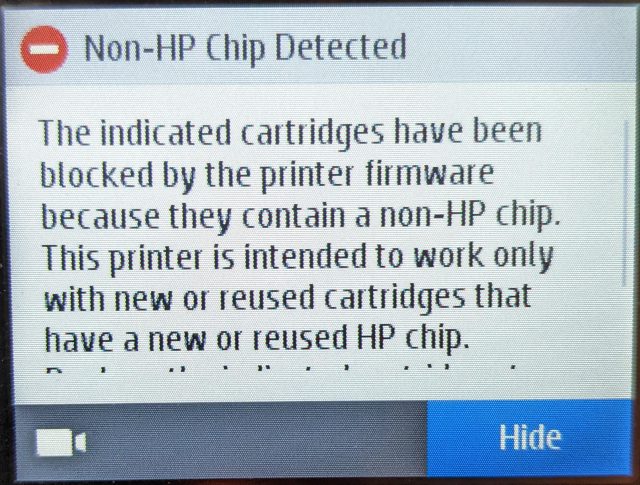HP has used its “Dynamic Security” firmware updates to “create a monopoly” of replacement printer ink cartridges, a lawsuit filed against the company on January 5 claims. The lawsuit, which is seeking class-action certification, represents yet another form of litigation against HP for bricking printers when they try to use ink that doesn’t bear an HP logo.
The lawsuit (PDF), which was filed in US District Court in the Northern District of Illinois, names 11 plaintiffs and seeks an injunction against HP requiring the company to disable its printer firmware updates from preventing the use of non-HP branded ink. The lawsuit also seeks monetary damages greater than $5,000,000 and a trial by jury.
The lawsuit focuses on HP printer firmware updates issued in late 2022 and early 2023 that left users seeing this message on their printers when they tried to print with non-HP ink:

HP was wrong to issue a firmware update affecting printer functionality, and users were not notified that accepting firmware updates “could damage any features of the printer,” the lawsuit says. The lawsuit also questions HP’s practice of encouraging people to register their printers and then quietly releasing updates that change the printers’ functionality. Additionally, the lawsuit highlights the fact that the use of non-HP ink cartridges doesn’t break HP’s printer warranty.
The filing reads:
… it is not practical or economically rational to purchase a new printer in order to avoid purchasing HP replacement ink cartridges. Therefore, once consumers purchase their printers, the Dynamic Security firmware updates lock them into purchasing HP-branded ink.
HP is proud of its strategy of locking in printer customers. Last month, HP CFO Marie Myers praised the company’s movement from transactional models to forcing customers into continuous buys through offerings like Instant Ink, HP’s monthly ink subscription program.
“We absolutely see when you move a customer from that pure transactional model … whether it’s [to] Instant Ink, plus adding on that paper, we sort of see a 20 percent uplift on the value of that customer because you’re locking that person, committing to a longer-term relationship,” Myers said, as quoted by The Register.
HP says Dynamic Security is meant to “protect the quality of our customer experience, maintain the integrity of our printing systems, and protect our intellectual property.” HP’s Dynamic Security page says that HP printers with the feature “are intended to work only with cartridges that have new or reused HP chips or electronic circuitry. The printers use the Dynamic Security measures to block cartridges using non-HP chips or modified or non-HP electronic circuitry.”
Conveniently timed priced hikes?
The new lawsuit claims that HP’s firmware updates forced customers to buy HP-brand ink that costs more than competitors.
When reached for comment, Peggy Wedgworth, a senior partner at the Milberg law firm and one of the lawyers representing the plaintiffs in this case, told Ars Technica:
HP effectively monopolized the aftermarket for replacement ink cartridges in violation of federal and state antitrust laws, which forced HP printer owners to purchase only HP-branded ink at high prices and lose the value of any non-HP branded replacement ink cartridges.
The lawsuit accuses HP of raising prices on its ink “in the same time period” that it issued its late 2022 and early 2023 firmware updates, which “create[d] a monopoly in the aftermarket for replacement cartridges, permitting [HP] to raise prices without fear of being undercut by competitors.
The lawsuit doesn’t cite a source to back up its price-hike claims. But Ars Technica had a quick look at Amazon pricing, via Camelcamelcamel, for some of HP’s ink offerings that, as of this writing, closely match (within cents) the pricing on HP’s website. We found that ink prices for some—but not all— of HP’s ink cartridges did, in fact, increase in late 2022 and early 2023. There are various factors that could contribute to a product’s price increasing, though.
-
Per Camelcamelcamel, Amazon’s pricing for HP 67 tri-color ink shows a price increase in late 2022, as the lawsuit suggests. There’s also a price hike in fall 2023, though.
Camelcamelcamel -
Camelcamelcamel’s listed Amazon pricing for HP’s 952XL high-yield black ink. There’s a price hike in spring 2022 rather than late 2022. There’s another price jump in late 2023, but not early 2023.
Camelcamelcamel -
Reported Amazon pricing for HP 910 black ink shows price hikes in the falls of 2022 and 2023.
Camelcamelcamel -
Reported Amazon pricing for HP’s 951 three-pack ink shows price jumps in summer 2022 and late 2023.
Camelcamelcamel -
Reported Amazon pricing for HP’s 63 tri-color ink shows price jumps in spring 2022 and late 2023.
Camelcamelcamel

